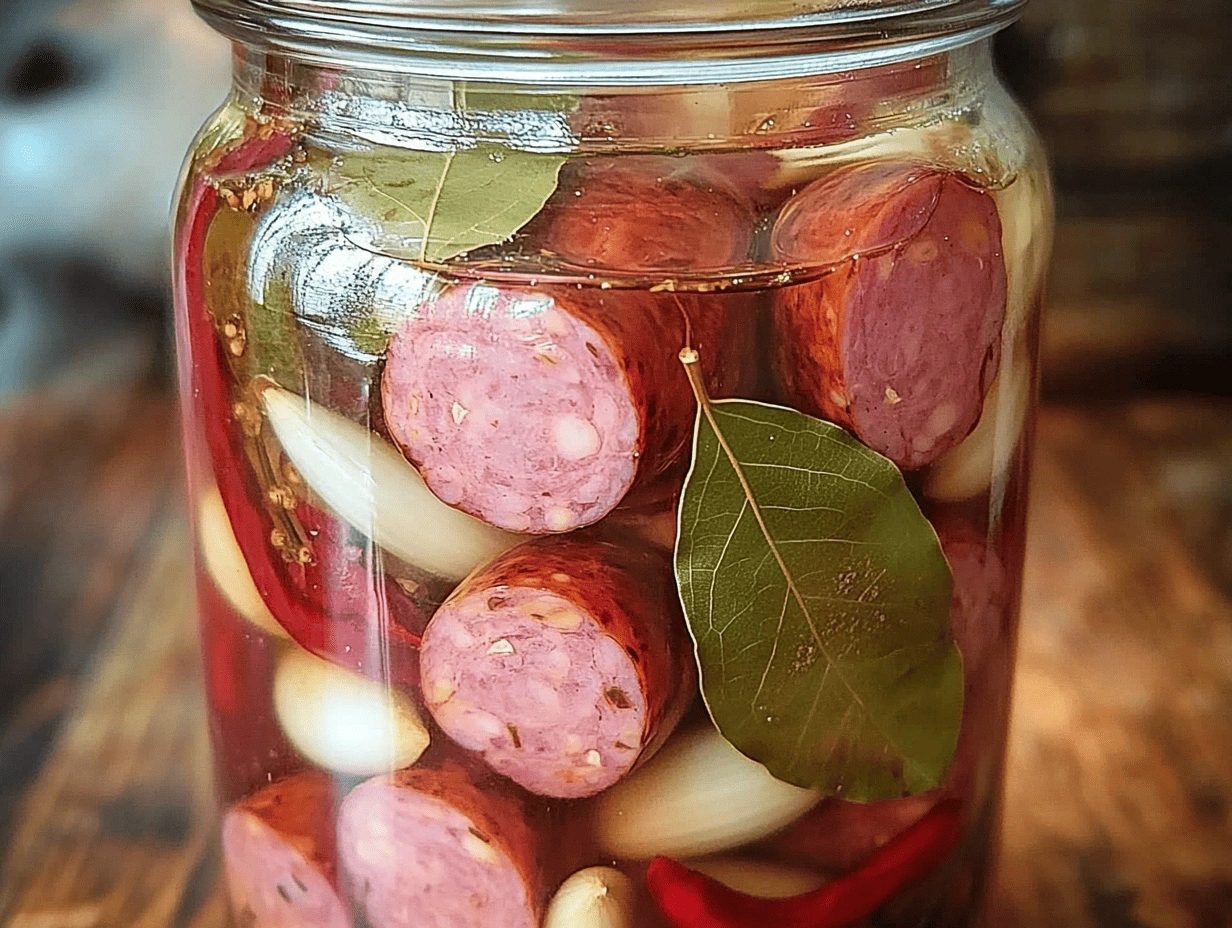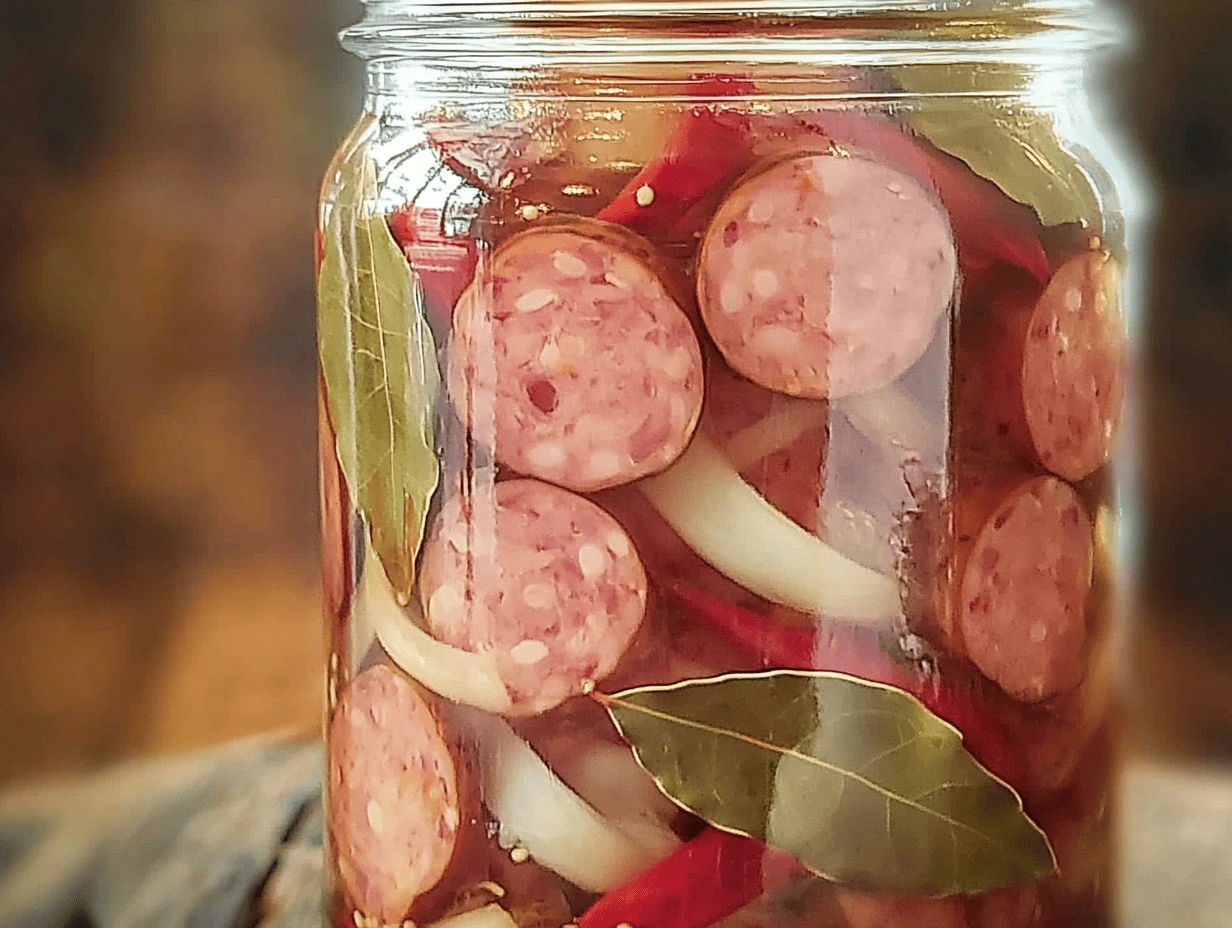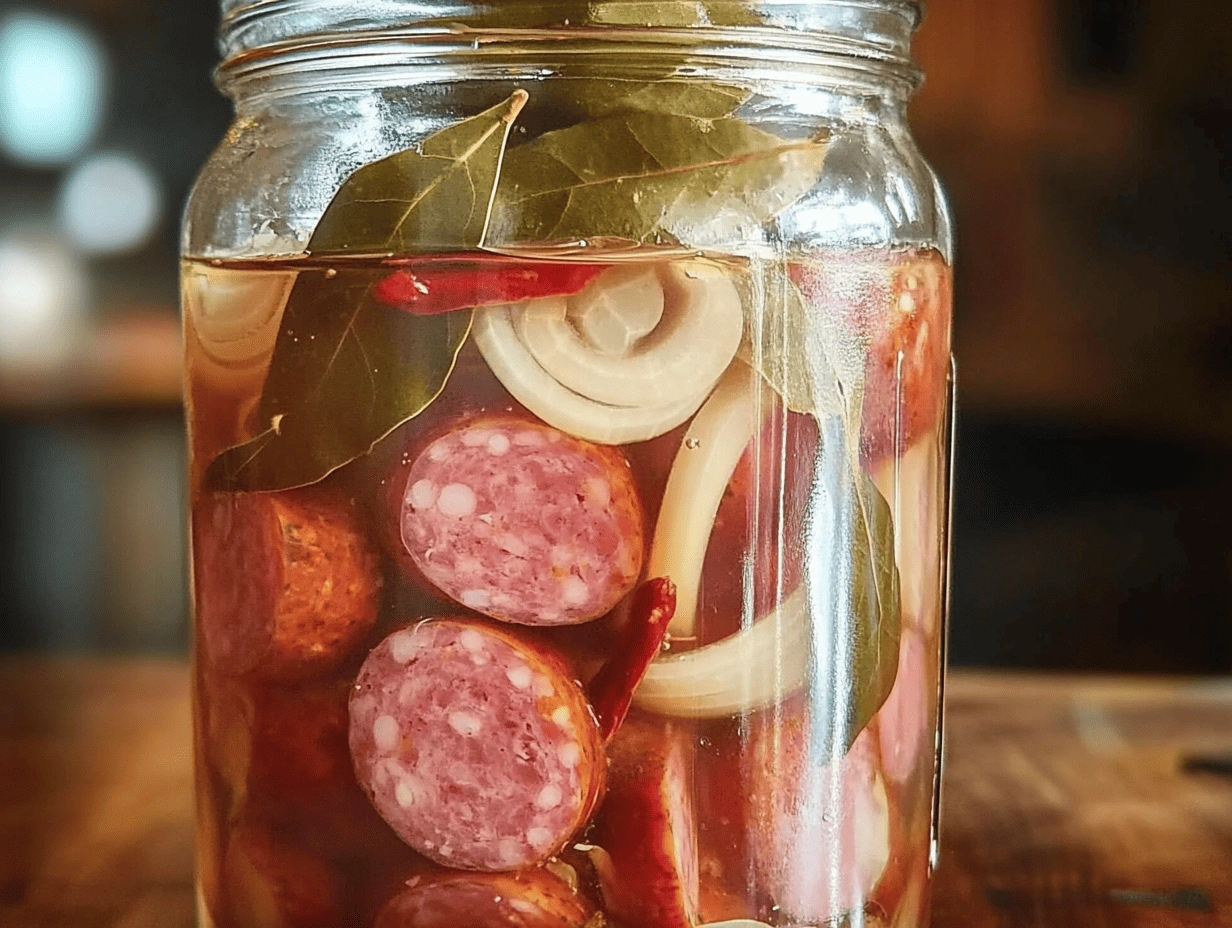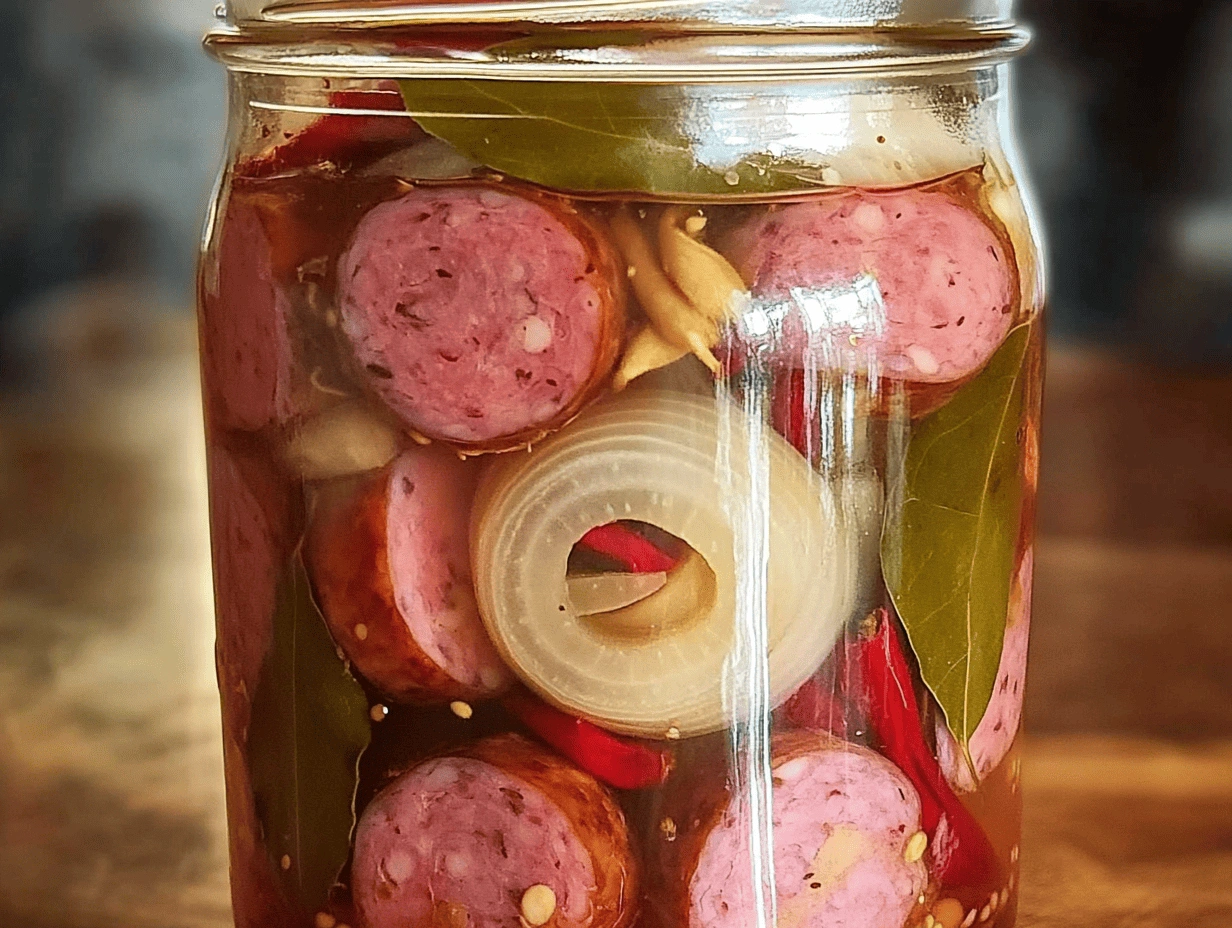Introduction
Pickled sausages are a tangy and flavorful snack loved by many. Whether enjoyed straight from the jar, incorporated into recipes, or served as appetizers, proper storage is essential for maintaining their taste and safety. A common question arises: Do pickled sausages have to be refrigerated? This guide provides the answer, along with tips for storage, the pickling process, and how to identify signs of spoilage.
Understanding Pickled Sausages
What Are Pickled Sausages?
Pickled sausages are cooked or cured sausages preserved in a brine made from vinegar, water, salt, and spices. This preservation method enhances their flavor while extending their shelf life. Historically, pickling was widely used before refrigeration became common.
Unopened jars of pickled sausages can typically be stored at room temperature due to the acidic brine. However, do pickled sausages have to be refrigerated? The answer depends on whether the jar is opened. Refrigeration is necessary after opening to slow spoilage and ensure the sausages remain safe to eat.
If you want to try making your own pickled sausages, you can check out this Do Pickled Sausages Need to Be Refrigerated?
The Pickling Process
Pickling creates an acidic environment that prevents bacteria from growing. Here are the basic steps:
- Cook or Cure the Sausages
- The sausages are fully cooked or cured to prepare them for preservation.
- Prepare the Brine
- A mixture of vinegar, water, salt, and spices is combined to create a tangy, preserving liquid.
- Submerge the Sausages
- Sausages are immersed in the brine to absorb the flavor and prevent spoilage.
- Seal the Jar
- Airtight sealing blocks air, keeping the contents fresh until the jar is opened.
Once the jar is opened, bacteria can enter. This is why many people ask, “Do pickled sausages have to be refrigerated?” The answer is yes—refrigeration is essential after opening.
Nutritional Profile of Pickled Sausages
Pickled sausages are a protein-rich snack but can be high in sodium due to the brine. Here’s a quick overview:
- Protein: Helps repair and build muscles.
- Sodium: The brine adds a significant amount of salt, so moderation is key.
- Vitamins and Minerals: Depending on the recipe, pickled sausages may provide vitamins like B12 and minerals like iron.
For more information about their nutritional value Pickled Sausage Shelf Life
Storage Guidelines for Pickled Sausages

Do Pickled Sausages Need to Be Refrigerated?
Whether or not do pickled sausages have to be refrigerated depends entirely on the status of the jar—whether it is unopened or has been opened. Proper storage is crucial to maintain the sausages’ flavor, texture, and safety for consumption. Below is a detailed breakdown of the storage requirements for pickled sausages based on the jar’s condition:
Unopened Jars
Sealed jars of pickled sausages can be stored in a cool, dark place such as a pantry or cupboard. The acidic brine used in pickling creates an environment that prevents bacterial growth, allowing the sausages to remain fresh for a long time. As long as the seal is intact and the jar remains unopened, refrigeration is not required.
- Storage Location: Pantry or cupboard, away from direct sunlight or heat.
- Why Refrigeration Is Unnecessary: The brine protects the sausages and keeps them fresh until the jar is opened.
- Shelf Life: Unopened jars can last for up to a year, provided they are stored correctly.
Opened Jars
- Refrigeration: Always store the jar in the refrigerator once opened to keep the sausages fresh.
- Why Refrigeration Is Necessary: Air exposure encourages bacterial growth, and refrigeration slows this process.
- Storage Tip: Ensure that the jar is tightly sealed and that the sausages are fully submerged in the brine to preserve their flavor and safety.
This highlights why it’s essential to ask, do pickled sausages have to be refrigerated? The answer depends on the jar’s status: unopened jars can be stored at room temperature, but opened jars must always be refrigerated.
For more storage tips, visit Homemade Pickled Sausage
Shelf Life of Pickled Sausages
How long pickled sausages stay fresh depends largely on how they are stored. Proper storage practices can significantly extend their shelf life, allowing you to enjoy this delicious snack for weeks or even months. If you’re wondering, do pickled sausages have to be refrigerated, the answer is yes for opened jars, as refrigeration is key to maintaining their freshness.
Unopened Jars
Sealed jars of pickled sausages have a long shelf life due to the preserving properties of the brine. When stored in a pantry or other cool, dark place, unopened jars can remain fresh for up to a year. However, you should always check the seal before opening the jar to ensure it hasn’t been damaged or compromised.
- Duration: Up to 12 months when stored correctly.
- Key Storage Tip: Keep the jars in a cool and dark place, away from sunlight and heat, to maintain their quality.
- Seal Check: Always inspect the seal before opening the jar. If the seal is broken or damaged, the contents may no longer be safe to eat.
Opened Jars
Once the jar is opened, the shelf life of the sausages depends on refrigeration. When stored in the refrigerator and kept fully submerged in the brine, opened jars typically stay fresh for 1–3 months. The acidic environment of the brine slows bacterial growth, but refrigeration is key to extending freshness.
- Duration: Opened jars last 1–3 months when refrigerated properly.
- Storage Tip: Ensure the sausages are fully covered by the brine to maintain their flavor and prevent spoilage.
- Refrigeration Reminder: Always refrigerate immediately after opening to ensure the sausages stay safe to eat.
Understanding proper storage practices and asking, do pickled sausages have to be refrigerated? is vital for maintaining their shelf life. Unopened jars are shelf-stable, but refrigeration becomes essential for opened jars.
Signs of Spoilage in Pickled Sausages
It’s important to inspect pickled sausages carefully before consuming them. Even with proper storage, sausages can spoil over time, especially if the jar was not stored correctly or if air entered the jar after opening. Below are some common signs that your pickled sausages may no longer be safe to eat.
Strange Smell
One of the most obvious signs of spoilage is an unusual odor. If the sausages have a sour or unpleasant smell, this is a strong indication that bacteria have developed, and the sausages should not be consumed.
- What to Smell For: Pickled sausages should have a tangy, vinegary aroma. A sour, musty, or foul smell suggests spoilage.
- Why It Happens: Bacterial growth alters the brine and the sausages, causing unpleasant odors.
- Action: If the jar smells off, discard it immediately.
Discoloration
Another sign of spoilage is the appearance of discoloration. Pickled sausages should maintain their usual color, but if you notice mold, dark patches, or unusual changes in color, this is a sign that the sausages are no longer safe to eat. If you’ve wondered, do pickled sausages have to be refrigerated, proper refrigeration can help prevent these signs of spoilage after opening the jar.
- What to Look For: Check for mold, cloudy brine, or any significant color changes.
- Cause of Discoloration: Exposure to air or improper storage can lead to bacterial or mold growth, which affects the appearance of the sausages.
- Action: If you see discoloration, do not consume the sausages.
Check out Are Pickled Sausages Healthy?
Slimy Texture
A slimy texture is another clear indicator of spoilage. Fresh pickled sausages should have a firm, consistent texture. If they feel slimy or sticky, this is a sign of bacterial growth, and the sausages should be discarded immediately.
- What to Feel For: Sliminess or stickiness on the sausages.
- Cause of Texture Change: Improper storage or air exposure allows bacteria to multiply, causing texture changes.
- Action: Do not eat slimy sausages, as they are likely unsafe.
To ensure your pickled sausages remain safe to eat, always inspect them carefully and store them properly. Understanding the answer to do pickled sausages have to be refrigerated can help prevent spoilage and foodborne illness.
Best Practices for Storing Pickled Sausages: Do pickled sausages have to be refrigerated

Choosing the Right Container
Temperature Considerations
Storing pickled sausages at the right temperature is essential for their safety and quality.
- Refrigerator Settings: Keep the refrigerator temperature below 40°F (4°C). This slows bacterial growth and helps the sausages stay fresh. If you’re wondering, do pickled sausages have to be refrigerated, maintaining this temperature is crucial after opening the jar?
- Avoid Temperature Fluctuations: Place the jar in a stable area of the refrigerator, such as the middle shelf. Avoid storing it in the door, where temperatures can change often.
By keeping the sausages in a consistently cool spot, you help preserve their flavor and texture. Always remember, do pickled sausages have to be refrigerated, especially for opened jars, to ensure they remain safe to eat.
Check out this Do Pickled Sausages Need to Be Refrigerated?
Proper Handling of Pickled Sausages
Proper handling of pickled sausages is crucial for maintaining their quality, flavor, and safety. Simple but effective practices can help prevent contamination and spoilage, ensuring that you can enjoy your sausages for as long as possible. Many people ask, do pickled sausages have to be refrigerated, and while refrigeration is important, handling them properly is equally vital for their longevity. Here are some tips to follow:
Use Clean Utensils
When removing pickled sausages from the jar, always use clean, dry utensils. Dirty or wet utensils can introduce bacteria into the brine, compromising the quality and safety of the sausages. If you’ve ever asked, do pickled sausages have to be refrigerated, remember that proper handling goes hand in hand with correct storage.
- Why It Matters: Contaminants introduced by unclean utensils can speed up spoilage and affect the taste.
- Best Practices:
- Wash and dry utensils thoroughly before using them.
- Avoid touching the sausages with your hands, as this can transfer bacteria into the jar.
By keeping the brine free of contaminants, you help ensure the sausages remain fresh, especially after asking, do pickled sausages have to be refrigerated, and storing them correctly.
Keep Sausages Submerged
One of the most important rules for handling pickled sausages is ensuring they remain completely submerged in the brine. The brine acts as a protective barrier, preserving the sausages and preventing the growth of harmful bacteria. If you’re wondering, do pickled sausages have to be refrigerated, keeping them properly submerged is crucial, especially after opening the jar.
- Why Submersion Is Crucial: Exposed sausages can dry out, lose flavor, and become more susceptible to spoilage.
- How to Ensure Full Coverage:
- Gently press the sausages down into the brine after removing some from the jar.
- If the brine level is low, consider adding more brine to keep the remaining sausages covered.
Understanding do pickled sausages have to be refrigerated highlights how refrigeration works in tandem with keeping sausages submerged to maximize their shelf life.
Key Benefits of Proper Handling
When combined with proper storage practices, handling pickled sausages correctly can significantly reduce the risk of spoilage. These simple steps—using clean utensils and keeping the sausages submerged—are essential for maintaining their freshness and flavor.
In conclusion, do pickled sausages have to be refrigerated is just one part of the equation. Proper handling practices like clean utensil use and keeping sausages submerged in brine ensure that your pickled sausages stay safe, tasty, and enjoyable for longer.
Culinary Uses and Enjoyment

Enjoying Pickled Sausages Straight from the Jar
Eating pickled sausages straight from the jar is a convenient and delicious way to savor their tangy flavor. However, it’s essential to handle the jar properly to maintain the sausages’ freshness and safety. Many wonder, do pickled sausages have to be refrigerated, and the answer plays a role in how you enjoy them directly from the jar.
- Use Clean Utensils: Always use clean and dry utensils to remove each sausage to avoid introducing bacteria into the brine.
- Close the Jar Tightly: After each use, ensure the jar is sealed tightly and stored appropriately. If you’ve asked, do pickled sausages have to be refrigerated, remember that opened jars must always be kept in the refrigerator to preserve quality.
This simple method allows you to enjoy pickled sausages straight from the jar without compromising their safety or taste.
Using Pickled Sausages in Recipes
Pickled sausages add bold flavors to a variety of dishes. If you’re curious, do pickled sausages have to be refrigerated, keeping them properly stored ensures they’re ready to use in recipes like these:
- Salads: Slice them thin and add them to pasta salads or green salads for extra tang.
- Wraps and Sandwiches: Use pickled sausages as a filling to enhance the flavor of wraps and sandwiches.
- Party Platters: Pair them with cheese, crackers, and pickled vegetables to create an easy appetizer.
By using pickled sausages creatively, you can elevate simple meals with minimal effort. Always consider, do pickled sausages have to be refrigerated, to ensure they stay fresh and flavorful for every meal.
FAQs
Do Pickled Sausages Need to Be Refrigerated After Opening?
Yes, you should always refrigerate opened jars of pickled sausages. When the jar is exposed to air, bacteria grow more easily. Storing the sausages in the refrigerator slows this process, which keeps them fresh and safe to eat.
Can Pickled Sausages Be Frozen?
We do not recommend freezing pickled sausages. Freezing often changes their texture, making them softer and less appealing. It also affects the brine, which may alter the flavor of the sausages.
Are Pickled Sausages Safe After the Expiration Date?
Unopened jars of pickled sausages may remain safe for a short time after their expiration date if stored in a cool, dark place. However, you should inspect them carefully before eating. Look for spoilage signs like discoloration, bad smells, or unusual textures.
What Are the Foodborne Illness Risks of Pickled Sausages?
Improper storage or handling of pickled sausages increases the risk of foodborne illnesses. Common issues include:
- Using dirty utensils, which contaminate the brine.
- Storing jars in unstable temperatures, like the refrigerator door.
To minimize these risks, always handle and store pickled sausages carefully.
Conclusion
Pickled sausages are a delicious and versatile snack you can enjoy in many ways. If you’re wondering, do pickled sausages have to be refrigerated, the answer is yes—opened jars must be stored in the refrigerator to maintain their freshness. Use airtight containers and handle the sausages properly to ensure they remain safe to eat.
Whether you eat them straight from the jar or add them to creative recipes, pickled sausages can be a flavorful addition to your meals. Keeping in mind do pickled sausages have to be refrigerated, follow these tips to enjoy their full flavor without worry.
For additional recipe inspiration, visit Allrecipes.


2 thoughts on “Do pickled sausages have to be refrigerated?”